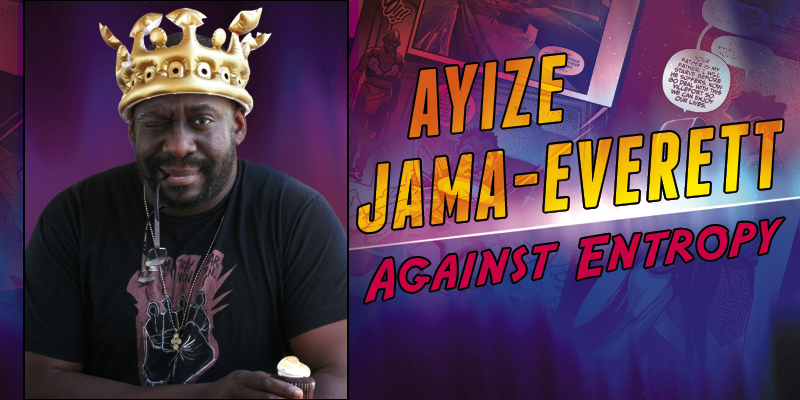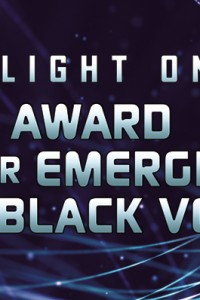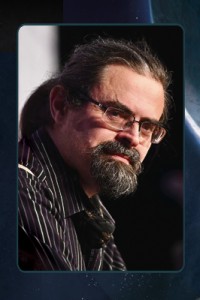Ayize Jama-Everett: Against Entropy

AYIZE JAMA-EVERETT was born in 1974 in Harlem NY. He has traveled widely, including in Asia, Mexico, and North Africa. He has a master’s degree in divinity, another in clinical psychology, and recently finished his MFA in literature at UC Riverside. He currently lives in Oakland CA, where he works as a therapist.
Jama-Everett began publishing with SF novel The Liminal People (2011), launching a series that continued with The Liminal War (2015) and The Entropy of Bones (2015). He also writes comics, including “ethno-gothic” horror series Box of Bones in collaboration with John Jennings (2021).
“I was reading comics from the time I was eight or nine years old, and then started reading other books. I still believe that my destiny is to write for the X-Men comic books. Before the movies, before everything, I was one of those kids. I was dyslexic, and I was going to get left back in the second grade because they thought I couldn’t read. My uncle said, ‘You can read.’ He bought me a bunch of comics and said, ‘I’ll buy you more if you can tell me what each one was about.’ I said, ‘Got it.’ I went through them, boom boom boom boom boom. ‘See, he can read!’
“Comics were the thing that got me into writing; writers like Chris Claremont, of X-Men, were my ideal: ‘That’s what I want to do. I want to write comics.’ I was super comics-focused. When I first came out to California, I started working at Comic Relief in Berkeley – it was a pivotal comic book store. Adrian Tomine and Richard Sala and all these famous comic folks used to come in, and I was trying to make comics. I was working with unpublished artists, though, and maybe I just picked the wrong people, who weren’t serious, but it was just impossible for me to get something going with an artist. Eventually I decided, ‘Well, I just gotta write novels.’
“There were some prose writers I really respected too. Andrew Vachss is one of them, and Walter Mosley, of course, and Octavia E. Butler – folks that I started reading early and thought, ‘Okay, I’ll write like them.’ I wrote a really shitty novel that was 700 pages, and then wrote a decent novel that was 400 pages, and then wrote another decent novel and decided to send it out. I joined a writers’ group and all that, and I got some of the best rejection letters on the planet. ‘This is some really great science fiction novel; unfortunately, we only publish fantasy.’ Or, ‘This is a really great fantasy novel; unfortunately, we only publish science fiction.’ Finally someone said, ‘Hey, look – this is great writing, but this is a really complex story. Have you ever thought about writing something simpler?’ An editor said that to me, and I just got angry. ‘What the fuck, who says that? Who says write simple? Fuck you! You want something simple? I’ll write something simple!’
“So I took one of the characters from that novel and I just made it about him and tried to do a straightforward – as straight as I can do – missing-person/crime/noir thing. That was Liminal People. I was so frustrated with the publishing industry, I decided to self-publish. I made every single mistake you could make as a self-publisher. The copyediting was wrong, the type of paper was wrong, the size was wrong – all these things. But I started thinking of the book as my calling card; as this sort of beginning. I sent it to Nalo Hopkinson, who had been a champion of mine ever since I was a shitty writer, and she said, ‘You know what, I think this is good. You should send it to Gavin Grant at Small Beer Press.’ That’s why the Liminal books live there. I’m pretty loyal when people give me a shot. I tend to reward them with everything I’ve got. Then a friend of mine introduced me to John Jennings, and John did the cover for the second and third books.
“John and I are both comic-book heads, so we got together and did our comic book Box of Bones. Then he started the imprint of Megascope and said, ‘I’m thinking about doing a Count of Monte Cristo in outer space.’ I’d just finished reading this book about Alexandre Dumas’s father. He was one of the first Black generals in France, and he was a peer of Napoleon’s. But I said, ‘I don’t know, I’m not really feeling space stuff right now.’ I feel like you have to address Earth if you are going to go to space – you can’t just pick up and get a new planet. It shouldn’t work like that, or so I think. I said, ‘No, screw outer space. Let’s do it on Earth with climate change.’ He was like, ‘Dope, let’s do it.’
“The artist for that project is a guy named Tristan Roach, who is out of the Caribbean. He’s freaking awesome. John’s like an executive pro
ducer. I do a lot of description in the script. I’m trying to capture some of the tone of The Count of Monte Cristo, that belabored old French in translation, so there’s some lofty language and some big, weird speech bubbles. I think the biggest difference is that, unlike comics, a novel starts and stops with me, so if I want something in there, I have to get it in there myself. Comics are such a collaborative medium, and I can describe until the cows come home, but if the artist isn’t getting it, the artist isn’t getting it. Artists also have things they want to say, and things they want to draw – they have their own perspective, and a good collaboration makes room for that. It’s a balance.
“With Box of Bones, I wrote scripts in three different ways for the artists. For some, it was, ‘Here are broad descriptions – give me back your illustrations, and I’ll put the dialogue in the bubbles.’ For others, it was, ‘Here’s a description for every page, and here’s the dialogue for every page; you do the panel breakdown.’ For others, I said, ‘Page one, panel one, here’s what going on.’ I have to be flexible with the different artists. So many artists.
“The process was mostly dialogue with artists about what they were used to, and what they were comfortable with. Some folks were not really classically trained comic book artists, so then we could come in and do panel breakdowns and figure out where the dialogue went. Some folks were trained the DC way – they wanted to see ‘Page one/panel one.’ It just depended on what the artists were used to and what they could work with. There were some folks we didn’t work with because they asked for a script a certain way, they got it, and then they were like, ‘Nah, I want to do it this other way.’ I went, ‘No no no no no. If I did all that work, someone is using this fucking script. Sorry, buddy.’ Again, it’s a collaborative medium, so some folks like to salsa, some folks like to merengue, some folks like hip hop – whatever it is.
“There’s another installment of Box of Bones that will be coming out next year, and we’re in conversation about possibly doing some other media stuff with it right now. We’re trying to get the read as to where to go with it – there might be some live-action stuff going on.
“Liminal People was supposed to be standalone, one-and-done. It’s about a broken healer named Taggert, a guy who’s forgotten he has the ability to heal bodies because he is so broken, and all he does is hurt other folks. He’s paid to do that, and encouraged to – his value is in his ability to inflict pain, which is all well and good until the one person in his life that he has admitted to loving asks him for help. At that point, pain can only take you so far; you have to learn how to heal again. He has to learn how to heal himself, and that meant facing some ugly sides of himself and some of the ugly parts of the world. Even though the book has been out since 2010, I don’t want to give too much away…. In the end, he has a family of choice, and he has chosen a new life that isn’t surrounded with pain. Or at least, the goal isn’t to be surrounded by pain anymore.
“The Liminal War is the next book, and explores more of who that family is and what they have to go through in order to stay a family. I had a friend one time, and I can’t remember what we were talking about, but I just remember being frustrated about some shit that happened when I was younger, and she said, ‘Do you realize that if everyone knew how special you were when you were younger, you probably wouldn’t have survived?’ I was like, ‘Oh, shit.’ I made my story about that: these people that attack love, or don’t know how special they are. When you come for a consummate killer’s kids, don’t expect him to go light on you. But also, I like underdogs, so Taggert can’t be the biggest, baddest person in the world. So who is bigger and badder than him? That’s entropy, the main villain, or villains, of the story – these creatures born of entropy, of the cooling of the universe and the eventual slow stop of everything. That became dynamic. And then, of course, I’m Black, so I have to put in some Black stuff. I had the characters go back in time and deal with the South and had them meet Bob Marley, and did an exploration of Black history through sound.
Interview design by Francesca Myman
Read the full interview in the March 2023 issue of Locus.
 While you are here, please take a moment to support Locus with a one-time or recurring donation. We rely on reader donations to keep the magazine and site going, and would like to keep the site paywall free, but WE NEED YOUR FINANCIAL SUPPORT to continue quality coverage of the science fiction and fantasy field.
While you are here, please take a moment to support Locus with a one-time or recurring donation. We rely on reader donations to keep the magazine and site going, and would like to keep the site paywall free, but WE NEED YOUR FINANCIAL SUPPORT to continue quality coverage of the science fiction and fantasy field.
©Locus Magazine. Copyrighted material may not be republished without permission of LSF







